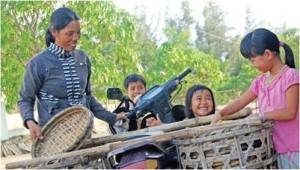
Photo: Nguyen Dang Hao, Vietnam. GAF3 2011
With world attention on climate change, two recent publications on gender and climate change, though not focused on fisheries and aquaculture, deliver a similar message: yes, women and men have different vulnerabilities to climate change, gendered analysis and approaches are needed but women and men’s agency, not just women and men’s vulnerabilities should be considered.
1. BRIDGE Cutting Edge Packs Gender and Climate Change
By Elaine Skinner UK Institute for Development Studies
Summary: Responses to climate change tend to focus on scientific and economic solutions rather than addressing the vitally significant human and gender dimensions. For climate change responses to be effective thinking must move beyond these limited approaches to become people-focused, and focus on the challenges and opportunities that climate change presents in the struggle for gender equality.
“Move beyond simple assumptions about women’s vulnerability to highlight women’s agency in adapting to and mitigating climate change.”
The Overview Report offers a comprehensive gendered analysis of climate change which demystifies many of the complexities in this area and suggests recommendations for researchers, NGOSs and donors as well as policymakers at national and international level. The Supporting Resources Collection (SRC) provides summaries of key texts, conceptual papers, tools, case studies and contacts of organisations in this field, whilst a Gender and Development In Brief newsletter contains three articles including two case studies outlining innovative local led solutions.
2. The Gender and Climate Debate: More of the Same or New Pathways of Thinking and Doing?
by Bernadette P. Resurreccion
Asian Security Initiative Policy Series No. 10. Singapore RSIS Centre for Non-Traditional Security Studies (NTS)
Abstract: Feminist and development advocates have recently taken international agreement framers to task for the paucity of gender perspectives when defining climate change agendas, a gap which has led to the emergence of ‘gender and climate change’ discourses. This paper aims to contribute to this growing concern with gender and climate change adaptation by: (i) briefly reviewing international agreements and advocacy literature in order to understand the conceptual antecedents underlying gender and climate change discourses and their respective deficits; and (ii) engaging with past and current theorisations on gender, adaptation and resilience which are relevant to a better understanding of the linkages among gender, climate change adaptation and human security. This paper argues that ‘gender’ and ‘vulnerability’ have to be viewed as complex social and human security processes that defy current simplifications based on fixed and essentialised traits and properties of women that characterised the earlier women, environment and development (WED) discourse. Current gender and climate change discussions often build on this earlier strand. An understanding of the complex linkages and processes of gendering and vulnerability is applied to recent climate change adaptation studies in Cambodia and Vietnam.
The Vietnam study addresses women and men in fish and shrimp farming areas.
This entry was posted in: Aquaculture, Freshwater Fisheries, Gender, Marine Fisheries, Men, Women
